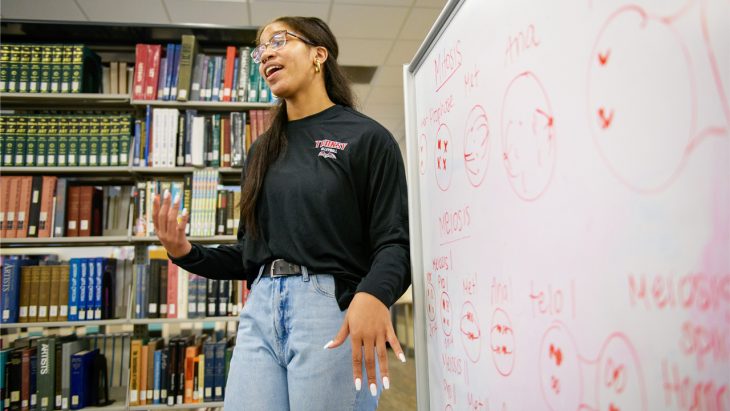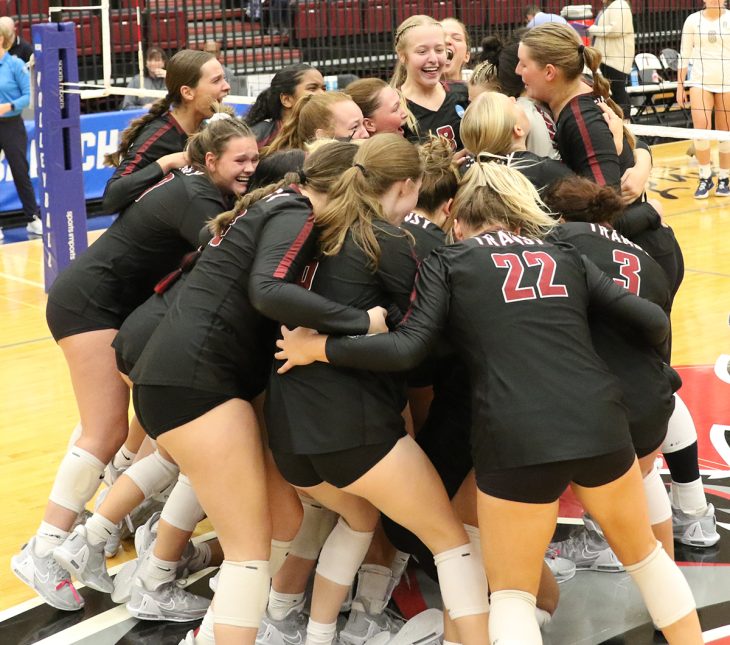
This article appeared in the most recent issue of Transylvania’s Third & Broadway magazine.
Forget what you might think about jocks being dumb. Transylvania University Pioneers lay that stereotype to waste.
They exemplify the synergy between athletics and academics — how the values learned in the heat of competition and during locker room pep talks also produce stellar scholars.
For senior Karrington Jackson, a dean’s list student and standout middle blocker for the volleyball team, organic chemistry wasn’t exactly a quick and easy bond. But she persevered — she’d learned through sports that when faced with a challenge, you just don’t roll over. You finish what you start.
“In a game, you just can’t give up and be like: ‘They’re winning so let’s just stop.’ You can’t just drop a class when it gets too hard,” says Jackson, an exercise science major from Louisville.
While a lot of success on the court and in the classroom is due to individual grit, some of it comes from the structure that athletics provides. Jackson knows that coaches are looking out for her, as are teammates taking the same tough classes.
More generally, the Transylvania community as a whole provides a support structure for student-athletes. Jackson tackled difficult organic chemistry equations with the help of one-on-one tutoring through the Academic Center for Excellence. In turn, she tutors other Pioneers who need help in anatomy and physiology and Latin.
Learning Skills Specialist Laura Scroggins said a majority of tutors are also student-athletes.
As with Jackson, she sees how they can transfer what they learn through sports into meeting challenging subject matter with a can-do attitude; in fact, it’s part of what Scroggins and other staff members in the Learning Skills Program help players realize.
Student-athletes already know they should go into a game with a sense of bravery, turning their anxious energy into excitement, Scroggins says. So she tells them: “If you can do this on the field with people cheering, and there are opponents coming at you, there’s no reason you can’t do this in the classroom.”
These Pioneers know about the hard work it takes to succeed. “If you want to do well in volleyball, you just aren’t playing volleyball over and over — you’re running drills, lifting weights, working on endurance,” Scroggins says. Academics is like that too; it’s not just sitting in the classroom or looking through a textbook. You find multiple ways to approach the content, seek out guides to help you practice it, set goals and don’t expect immediate results. They also sometimes do academic drills as a group under the guidance of a tutor, like soccer players doing shuttle runs for a coach.
Another key of both athletics and academics is teamwork. “If you’re not doing well on the court, you just don’t go into your room and sit by yourself,” Scroggins says. “You reach out to people and practice together.”
Madison Bell ’22, a former track and cross country captain from Lexington, helped her teammates perform in both areas. Bell, who’s pursuing a master’s degree in secondary STEM education, got a head start in her career helping teammates study science on long bus rides — Transylvania is the southernmost school in the Heartland Collegiate Athletic Conference, so there’s plenty of time for that.
On the other hand, track (and schoolwork) can force runners to dig deep on an individual level. “When you’re running, you’re fighting yourself in a sense,” Bell said. “You have to find exactly what you’re fighting for, and you have to focus on that.”
A big part of that focus is time management, adhering to a schedule of going to class, studying and running. This ties into committing yourself to a process, in developing a plan with your coach and following through with it. “If you’re doing the work at practice, you need to trust in yourself and your coaches and that you will get to where you want to be,” Bell says. For instance, this might mean not getting worked up if somebody you usually beat is running ahead of you, because you know that your strategy — say, when you’re supposed to peak — is independent of your competitors and relies on your inner strength and preparation.

“I feel like track has given me a lot of confidence,” Bell continues. She was a little freaked out when she first came to Transylvania because she’d heard a lot of classes are discussion based, and she was shy in high school. But now that she’s put herself out there in front of crowds, coaches and teammates, she’s got the wind at her back when she has to speak publicly or contribute to a conversation with classmates.
Jakob “Jak” Birdsong, a men’s soccer midfielder and defender on the HCAC All Academic Team, noted how the discipline of college athletics helps young people grow as individuals. “When you step into college and you’re coming out of high school, you have to rely on yourself a lot more,” he says.
But this is a self-reliance supported by a community. Birdsong, of Liberty Township, Ohio, offers advice to students who’ll be starting college in the fall: “Be willing to reach out and ask people for help.” As with professors at a small school like Transylvania, coaches have got your back. If they see you’re struggling academically, they’ll do what they can to be of assistance.
Head volleyball coach Amy Barmore is a strong believer in helping her players excel academically. Her players serve each other as accountability partners, helping their teammates study and meet certain goals. They also set aside an hour on each road trip during the fall for hitting the books (even if they don’t feel like it).
“Volleyball is important, but we tell them that accountability and time management will allow them to succeed when they leave Transy and enter the real world,” Barmore says.
Jeff Chaney, associate athletic director for compliance and sport administration, says, “It starts with the coaches,” who make schoolwork a priority. “There is not a conflict; if there’s class or practice — you go to class.”
Many teams also have regular study halls, and coaches will meet individually with players whose GPA falls below a certain level.
Additionally, different offices across campus pull together to help student-athletes succeed. “The goal is all of us connecting,” Chaney says.
For instance, his department meets with Scroggins and her Learning Skills colleague Greg Strouse (to come up with the best tutoring times, e.g.), as well as talking with Writing Center director Scott Whiddon. The academic dean’s office is another resource, especially in identifying players who should get help with their classwork.
Even if they’re not in need of assistance with schoolwork, Transylvania student-athletes can benefit from various campus programs. For example, the Center for Academic and Professional Enrichment offers workshops for them to hone skills like writing resumes and interviewing for jobs. And mentors in the 100 Doors to Success program can guide them along their path in life.
“There are so many people who want to help,” Chaney says. “They want everybody to succeed.”

